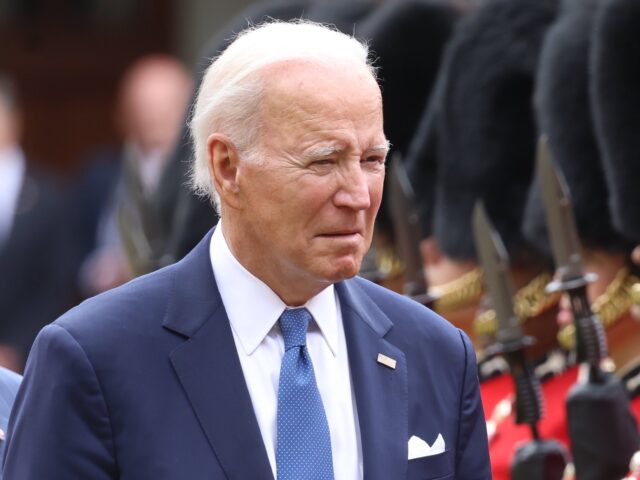President Joe Biden has already reached an “unwritten” nuclear deal with Iran, under which the regime will stop just short of developing a nuclear weapon, leaving Israel unable to act independently to defend itself.
That’s the analysis of Amos Harel, a columnist for left-wing Israeli daily Ha’aretz — who is no fan of Israeli Prime Minister Benjamin Netanyahu, but warns that the Biden White House is pushing Israel into a corner.
Last month, as Breitbart News reported, the U.S. and Iran were close to a “mini-deal” under which Iran would stop uranium enrichment at 60%, short of the 90% needed for a bomb. It would also release U.S. hostages and abide by several other conditions. In return, the U.S. would agree not to apply more sanctions, object to Iran gaining access to billions of dollars in frozen assets, or pursue further action against Iran at the United Nations.
The “mini-deal” appeared derailed when news broke that U.S. envoy Robert Malley, long suspected of being an Iran appeaser, had been suspended for alleged misuse of classified material.
But Harel says the deal is on.
He writes:
In practice, what’s shaping up looks more like an unwritten agreement of which a significant portion is already starting to be implemented. The Biden administration is declining to term it officially an agreement, not least because that would stir a negative response by the Republicans in Congress.
The U.S. initiative is based on a freeze in return for a release. Iran has committed not to enrich uranium above a level of 60 percent – that is, not to reach the 90-percent level at which nuclear arms can be manufactured. Washington, for its part, has withdrawn its opposition to the release of Iranian assets worth $20 billion in banks across several countries. Iran and Western countries will mutually release prisoners and kidnapping victims. These unofficial understandings have already taken effect, and it looks as though Iran has slowed down, if it hasn’t already stopped, enriching uranium to high levels. The compromise effort is being coordinated by Brett McGurk, the Biden administration’s National Security Council coordinator for the Middle East and North Africa.
Concurrently, the Americans sought to place Israel in a kind of bear hug. On the one hand, they are more generous when it comes to official publicity about joint military exercises, which imply joint attack capability against Iran (and it could be they are also willing to discuss this in greater detail in backrooms). On the other hand, their expectation is apparently for Israel not to take them by surprise in the form of an independent attack on Iran. More than a decade ago, the U.S. invested a major effort, both in collecting friendly intelligence and in moves that can be described as “soft influence,” to ensure that no such scenario came to pass. Since then, one basic fact has changed: The Biden administration trusts Netanyahu even less than the administration of Barack Obama did.
In that context, it appears that Biden’s recent hostility toward Israel is not primarily about judicial reform, or about objection to the right-wing members of Israel’s Cabinet — both of which are domestic political issues. Rather, Biden is isolating Netanyahu on the world stage to ensure that Israel feels more reluctant to prepare military options to prevent Iran from going nuclear, even though Israelis, left and right, want that option.
Thus the Biden administration’s support for the Israeli opposition’s protests against judicial reform — which have included refusals by military reservists, including pilots, to serve — is not so much about the issue itself, but about crippling the Israeli military and undermining Netanyahu’s legitimacy. Biden prefers the idea of a conciliatory Israeli government; if he cannot have one, he wants one that is incapable acting decisively.
Harel notes that Biden is playing a double game, placing Israel in a “bear hug” — showing affection and support in ways that actually prevent Israel from moving independently. Hence, perhaps, the formal invitation to Israeli President Isaac Herzog — a ceremonial left-wing figure — to visit the White House, while Netanyahu remains, scandalously, uninvited. A new “Iran deal” may already be in place — without Senate approval, just like the last.
This may, in fact, have been Biden’s goal all along. In 2012, during his vice presidential debate with then-Rep. Paul Ryan (R-WI), Biden subtly shifted the goalposts. Originally, the goal had been to stop the Iranian nuclear program itself. Biden — defending the Obama administration’s approach — made the policy about stopping Iran from obtaining a nuclear weapon. Thus was the groundwork laid for today’s last-stop-before-a-bomb approach.
Joel B. Pollak is Senior Editor-at-Large at Breitbart News and the host of Breitbart News Sunday on Sirius XM Patriot on Sunday evenings from 7 p.m. to 10 p.m. ET (4 p.m. to 7 p.m. PT). He is the author of the recent e-book, Neither Free nor Fair: The 2020 U.S. Presidential Election. His recent book, RED NOVEMBER, tells the story of the 2020 Democratic presidential primary from a conservative perspective. He is a winner of the 2018 Robert Novak Journalism Alumni Fellowship. Follow him on Twitter at @joelpollak.

COMMENTS
Please let us know if you're having issues with commenting.